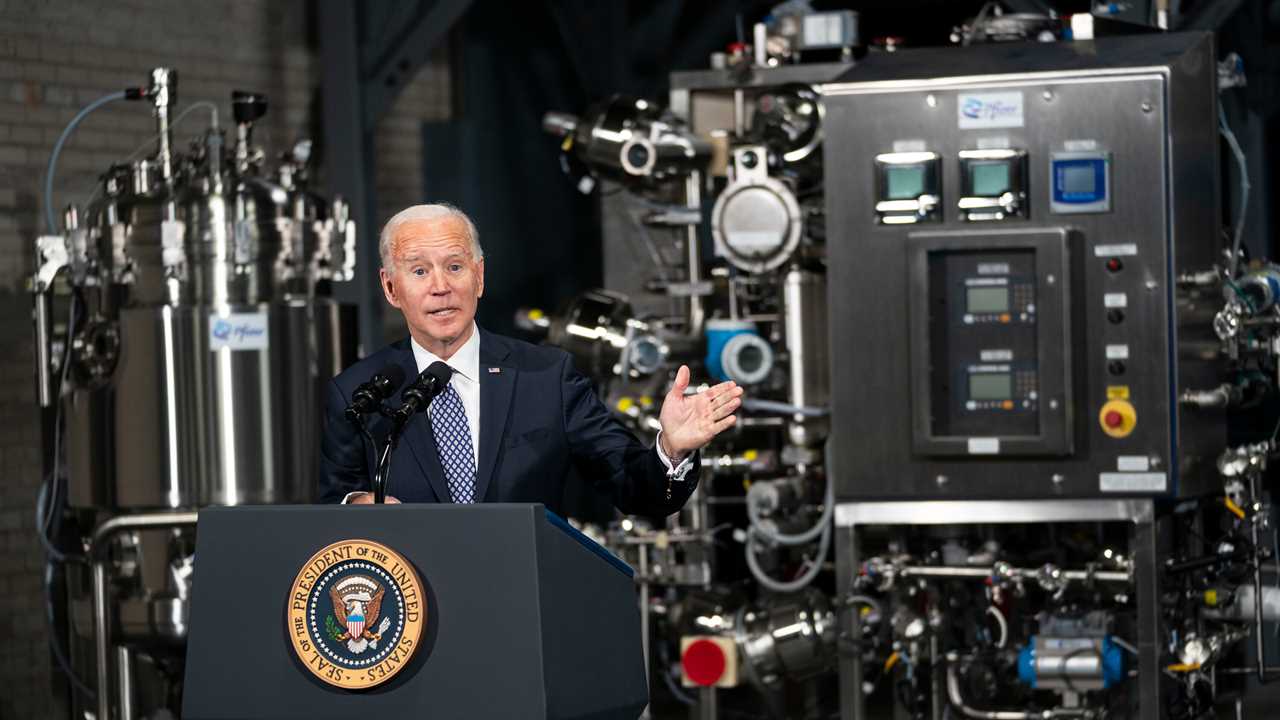
WASHINGTON — President Biden, on a visit to Pfizer’s coronavirus vaccine plant in Kalamazoo, Mich., said on Friday that the nation could be “approaching normalcy” by the end of the year, but cautioned that new virus variants and potential vaccine production problems could slow progress.
“God willing, this Christmas will be different than last, but I can’t make that commitment to you,” Mr. Biden said. “I can’t give you a date when this crisis will end, but I can tell you we are doing everything possible to have that day come sooner rather than later.”
His appeal for patience came hours after the White House issued a plea to local officials to quickly work through six million vaccine doses that have stacked up during winter storms, which delayed appointments and forced vaccine sites to temporarily shutter throughout the nation.
Andy Slavitt, a White House pandemic adviser, said at a news conference Friday morning that those doses represented about three days’ worth of shipping delays, and that states had made up for some of the backlog with existing stock. Of the six million doses, 1.4 million were already in transit on Friday, he said, and the rest were expected to be delivered in the next week.
“We’re asking vaccine administration sites to extend their hours even further and offer additional appointments and to try to reschedule the vaccinations over the coming days and weeks as significantly more supply arrives,” Mr. Slavitt said.
The delay was a sign of how interconnected the nation’s vaccine distribution network is, vulnerable to substantial interruptions because of extreme weather. Mr. Slavitt said that FedEx, U.P.S. and McKesson — the drug distribution giant that manages Moderna’s vaccine — had been impeded, with workers snowed in and unable to package and ship vaccines, including the supplies that go with them.
FedEx and U.P.S., which have vaccine shipping hubs in Memphis and Louisville, Ky., would make Saturday deliveries this week, he said.
Closed roads on delivery routes were also forming a bottleneck, and more than 2,000 vaccination sites in areas with power failures could not receive doses. That prompted federal officials to hold off shipping to areas that might not be able to keep them at the frigid temperatures required.
Shipment delays have been reported in California, Colorado, Florida, Illinois, Nevada, New Jersey, Ohio, Oregon, Utah and Washington, among other states. In Texas, where millions of residents lost power during the powerful storm this week, a delivery of more than 400,000 first doses and 330,000 second doses had been delayed in anticipation of the bad weather.
In New York City, Mayor Bill de Blasio said during an interview on WNYC that expected shipments of more than 100,000 doses had not fully arrived from factories; he did not say when they would come.
The city had to hold off on scheduling as many as 35,000 appointments for first vaccine doses because of shipment delays and vaccine shortages, he said. The opening of two new distribution sites on Thursday had also been postponed.
“Everything’s been disrupted by the storm,” Mr. de Blasio said.
Mr. Biden’s visit to Kalamazoo, where Pfizer produces one of two federally authorized coronavirus vaccines, piggybacked on hopeful developments that could potentially expand access to the company’s vaccine at a time when nations around the world are trying to ramp up vaccinations.
A study in Israel showed that the vaccine was robustly effective after the first shot, echoing what other research has shown for the AstraZeneca vaccine. It also raised the possibility that regulators in some countries could authorize delaying a second dose instead of giving both on the strict schedule of three weeks apart as tested in clinical trials.
Latest Updates
- California’s governor sets aside vaccine doses for teachers.
- California’s small business owners, suffering from the lockdown, push to recall Governor Newsom.
- Biden says the United States could be ‘approaching normalcy by the end of this year.’
Published in The Lancet on Thursday and drawing from a group of 9,100 Israeli health care workers, the study showed that Pfizer’s vaccine was 85 percent effective 15 to 28 days after receiving the first dose. Pfizer and BioNTech’s late-stage clinical trials, which enrolled 44,000 people, showed that the vaccine was 95 percent effective if two doses were given three weeks apart.
But Dr. Anthony S. Fauci, the government’s leading expert on infectious diseases and an adviser to Mr. Biden, said at the White House news conference that the results of the study were not significant enough to change recommendations in the United States, where regulators have held fast to the requirement that people receive two doses of the vaccine three weeks apart.
Pfizer’s chief executive, Dr. Albert Bourla, told CNN on Friday that he did not believe a single-dose regimen of his company’s vaccine would work but said the idea was being studied.
Pfizer and BioNTech also announced on Friday that their vaccine could be stored at standard freezer temperatures for up to two weeks, potentially expanding the number of smaller pharmacies and doctors’ offices that could administer the vaccine, which now must be stored at ultracold temperatures.
In a statement, the companies said they had submitted the new temperature data to the Food and Drug Administration, which would need to sign off on guidance to providers that would allow them to store the vaccines at the new temperatures.
Distribution of the Pfizer-BioNTech vaccine has been complicated by the requirement that it be stored in freezers that keep the vaccines between minus 112 and minus 76 degrees Fahrenheit.
Mr. Biden’s visit to Michigan came in the shadow of increasing pressure to clarify his administration’s message about when his vaccination campaign would be broad enough to reach every American. More than 40 million people have received a first dose of a vaccine, including about 16 million who have received two, according to recent figures released by the Centers for Disease Control and Prevention.






